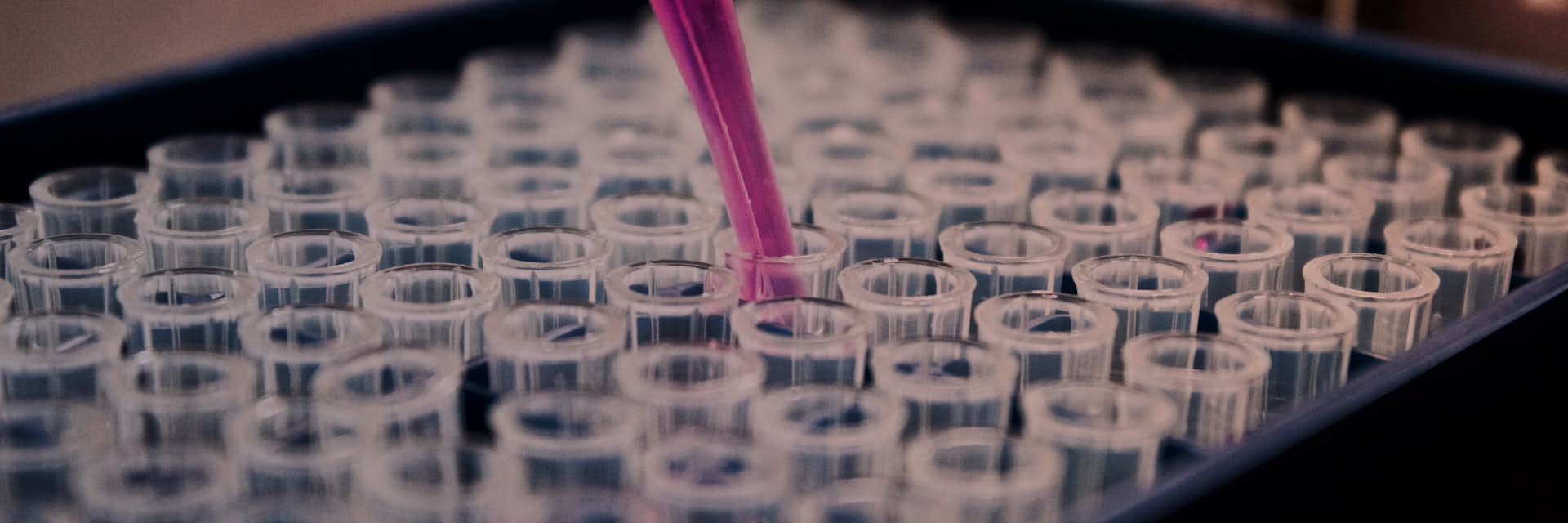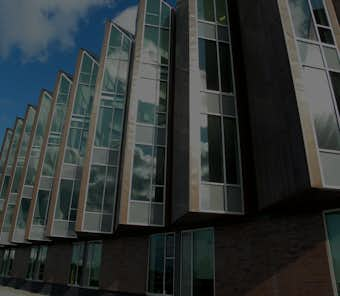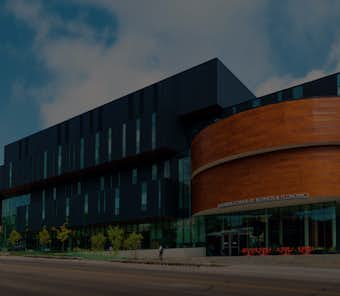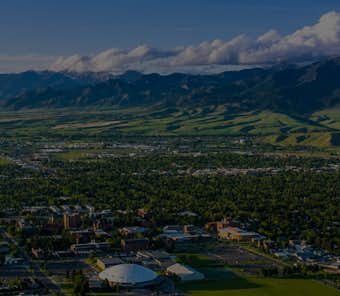
Study biotechnology abroad
Find programs that match your eligibility and aspirations then apply with reduced application fees, a free assessment and access to a dedicated advisor.
Find your perfect biotechnology programs abroad
Find biotechnology programs you love that match your needs & aspirations, where you stand a high chance of acceptance.
Biotechnology degrees abroad
Biotechnology, often referred to as biotech, is a science that uses biology and living organisms to develop new technologies and products. It develops breakthrough technologies and products that aim to improve the quality of our lives and the world around us.
It is at the forefront when it comes to tackling some of the biggest global issues, including healthcare, the environment and food supply. Choosing to study biotechnology abroad could put you at the cutting edge of new technology, and be a part of exciting new scientific discoveries.

Why use Studee?
-
Find your ideal program
Filter 10,000s of programs down to a shortlist perfect for you, where you have a strong chance of getting admitted
-
Apply online via Studee
Complete our application form and enjoy reduced application fees and access to unique Studee scholarships for many universities
-
We assess within 48hrs
We complete an 85-point assessment within 2 business days, help you with improvements then submit to your university
-
University offer in 2-4 weeks
We chase the university for your admission decision and keep you updated. We all celebrate your admission!
All our services are 100% free as we're funded by universities. You pay deposits and tuition fees directly to the university.

Biotechnology program structure
Biotechnology and bioscience degrees aim to give students a strong grounding in a range of science areas including chemistry, biochemistry and molecular biology.
What’s covered in biotechnology programs can vary widely between different universities and in different countries. Some focus more on certain aspects, whereas others try to offer a more rounded overview. Subjects and modules you can expect to study include:
- Biochemistry and molecular biology
- Chemistry
- Microbiology
- Proteins and enzymes
- Genetics
- Cell biology
- Pharmacology
The teaching methods will also depend on the university, as well as the course content and structure. However, most biotechnology programs are hands-on so there will be practical lab work as well as lectures, tutorials, and seminars.
The program assessment will usually be made up of a combination of coursework, written exams, essays, research projects, presentations, and write-ups of practical laboratory work.
Why study biotechnology abroad
Biotechnology is an exciting and dynamic subject that will put you on the cutting edge of new scientific discoveries. Choosing to study this relatively new area abroad means you could access more established and advanced facilities and programs than you might be able to find at home.
Choosing to spend several years living and studying abroad is also a fantastic opportunity to experience a new culture, make lifelong friends from other countries and improve your language skills. Learn more about the benefits of studying abroad here.


Where to study biotechnology abroad
Biotechnology programs are offered in many countries all over the world, so it can be tricky deciding on the best place to study. To help you make the right decision, think about:
- Your plans after graduation: If you want to pursue your career in biotechnology in the same country you study in, look at which countries offer the best job opportunities.
- The quality of the program: Look at the facilities each university offers, how it ranks for its biotechnology programs and read reviews of previous students to get an idea of the quality of education you’ll get.
- The type of country you want to live in: Think about things like the climate, culture and politics of each country to make sure the location you choose is somewhere you’ll enjoy living.
For more help making the right decision, read our guide on choosing where to study abroad.
Best countries to study biotechnology
Many of the best programs for biotechnology and biological science subjects can be found in the USA and Europe. The universities with the best reputations for science and technology are often where you’ll find the top biotechnology degree programs.
In Europe, the UK is perhaps the number one destination as it offers a number of top-ranked programs. France is also popular as it has a strong biotech industry, especially in the medical technology sector.
Switzerland and Germany are both home to a number of large biotech and pharmaceutical companies, making them an attractive option for those looking for a career after graduation.
Best universities to study biotechnology
To help you work out where the best university for you to study biotechnology, there are a few factors worth considering, including:
- The program structure, curriculum, and content, e.g. does it cover the areas you’re interested in
- Does the university offer internships, work placements or career support as part of the program
- How well is the university ranked for its biotechnology programs
- What organizations, accommodation, activities and sports teams the university offers
- The location of the university
It’s important to think about factors both inside and outside of the classroom when making your decision. Although finding the best possible program is important, you also need to make sure you’ll enjoy your time studying abroad.
Biotechnology study abroad programs
You can study biotechnology abroad at undergraduate and postgraduate level. As an undergraduate, most programs are offered as a Bachelor of Science (BSc).
At graduate you can study a master’s degree in biotechnology as an MSc, or some universities offer Master of Research (MRes) degrees. If you already have a master’s degree and want to continue your education, it’s possible to study for a PhD or MPhil in biotechnology.
Biotechnology undergraduate programs
Bachelor's in biotechnology
-
Biotechnology - BEng University College Absalon, Denmark
- Program type
- Bachelor's
- Duration
- 42 months
- Annual tuition fee
-
100,100 DKK
Fees are displayed in the university's local currency
- Start date
- September
-
Biotechnology/Biomedical Science - BSc RMIT University, Australia
- Program type
- Bachelor's
- Duration
- 4 years
- Annual tuition fee
-
38,400 AUD
Fees are displayed in the university's local currency
- Start date
- July, February
-

Biochemistry and Biotechnology - BSc (with placement) Wilfrid Laurier University, Canada
- Program type
- Bachelor's
- Duration
- 4 years
- Annual tuition fee
-
32,251 CAD
Fees are displayed in the university's local currency
- Start date
- January, September
-
Biological Sciences: Microbiology and Biotechnology - BSc DePaul University, USA
- Program type
- Bachelor's
- Duration
- 4 years
- Annual tuition fee
-
43,665 USD
Fees are displayed in the university's local currency
- Start date
- September, January, March
-
Biology: Biotechnology - BA/BSc Stockton University, USA
- Program type
- Bachelor's
- Duration
- 4 years
- Annual tuition fee
-
21,605 USD
Fees are displayed in the university's local currency
- Start date
- January, September
Associate in biotechnology
-
Biotechnology - ASc Berkeley City College, USA
- Program type
- Associate
- Duration
- 2 years
- Annual tuition fee
-
10,740 USD
Fees are displayed in the university's local currency
- Start date
- August, January
-
Biotechnology - ASc Santiago Canyon College, USA
- Program type
- Associate
- Duration
- 2 years
- Annual tuition fee
-
10,680 USD
Fees are displayed in the university's local currency
- Start date
- June, August, February
-
Biotechnology (Contra Costa College) - ASc Colleges of Contra Costa, USA
- Program type
- Associate
- Duration
- 2 years
- Annual tuition fee
-
9,840 USD
Fees are displayed in the university's local currency
- Start date
- August, January
Diploma in biotechnology
-

Applied Chemistry and Biotechnology - Dip Camosun College, Canada
- Program type
- Undergraduate diploma
- Duration
- 2 years
- Annual tuition fee
-
18,160 CAD
Fees are displayed in the university's local currency
- Start date
- September
-
Biotechnology - UGDip Humber College Institute of Technology and Advanced Learning, Canada
- Program type
- Undergraduate diploma
- Duration
- 2 years
- Annual tuition fee
-
16,803 CAD
Fees are displayed in the university's local currency
- Start date
- September, January
-
Biotechnology (Fast-Track) - OCDip Centennial College, Canada
- Program type
- Undergraduate diploma
- Duration
- 1 year
- Annual tuition fee
-
18,444 CAD
Fees are displayed in the university's local currency
- Start date
- September, January, May
-

Biotechnology - OCDip Mohawk College, Canada
- Program type
- Undergraduate diploma
- Duration
- 2 years
- Annual tuition fee
-
17,535 CAD
Fees are displayed in the university's local currency
- Start date
- September, January
-

Biotechnology - OCADip Seneca College of Applied Arts and Technology, Canada
- Program type
- Undergraduate diploma
- Duration
- 3 years
- Annual tuition fee
-
16,466 CAD
Fees are displayed in the university's local currency
- Start date
- January, September
Biotechnology graduate programs
Master's in biotechnology
-
Biotechnology - MSc American University, USA
- Program type
- Master's
- Duration
- 2 years
- Annual tuition fee
-
34,596 USD
Fees are displayed in the university's local currency
- Start date
- September, January
-

Biotechnology - MSc Marywood University, USA
- Program type
- Master's
- Duration
- 2 years
- Annual tuition fee
-
9,528 USD
Fees are displayed in the university's local currency
- Start date
- August, January, June
-
Biotechnology - MSc Duquesne University, USA
- Program type
- Master's
- Duration
- 2 years
- Annual tuition fee
-
24,525 USD
Fees are displayed in the university's local currency
- Start date
- August, January, May
-

Biotechnology - MSc Victoria University of Wellington, New Zealand
- Program type
- Master's
- Duration
- 1 year
- Annual tuition fee
-
37,571 NZD
Fees are displayed in the university's local currency
- Start date
- July
-
Biotechnology - MSc Stephen F. Austin State University, USA
- Program type
- Master's
- Duration
- 2 years
- Annual tuition fee
-
14,562 USD
Fees are displayed in the university's local currency
- Start date
- August, January
Doctorate in biotechnology
-

Biotechnology - PhD Lakehead University, Canada
- Program type
- Doctorate
- Duration
- 3 years
- Annual tuition fee
-
18,999 CAD
Fees are displayed in the university's local currency
- Start date
- January, May
-

Biotechnology - PhD University of Canterbury, New Zealand
- Program type
- Doctorate
- Duration
- 1 year
- Annual tuition fee
-
7,099 NZD
Fees are displayed in the university's local currency
- Start date
- June, July, August, September, October, November, January, February, March, April, May
-
Applied Biology & Biotechnology - PhD RMIT University, Australia
- Program type
- Doctorate
- Duration
- 4 years
- Annual tuition fee
-
36,480 AUD
Fees are displayed in the university's local currency
- Start date
- July, February
Diploma in biotechnology
-

Science: Biotechnology - PGDipSc University of Canterbury, New Zealand
- Program type
- Postgraduate diploma
- Duration
- 1 year
- Annual tuition fee
-
39,500 NZD
Fees are displayed in the university's local currency
- Start date
- July, February
Certificate in biotechnology
-
Biotechnology - PGCert California State University, East Bay, USA
- Program type
- Postgraduate certificate
- Duration
- 1 year
- Annual tuition fee
-
15,567 USD
Fees are displayed in the university's local currency
- Start date
- August, January
-
Biotechnology: Advanced (Fast-Track) (Optional Co-op) - OCGCert Centennial College, Canada
- Program type
- Postgraduate certificate
- Duration
- 2 years
- Annual tuition fee
-
18,444 CAD
Fees are displayed in the university's local currency
- Start date
- September, January, May

Entry requirements to study biotechnology abroad
The entry requirements you’ll need to meet to be accepted onto a biotechnology program will vary depending on the university you’re applying to. As a general rule you’ll need:
- Completed secondary education with good grades in relevant subjects - many programs require strong grades in chemistry, mathematics and one other science subject
- A personal statement that outlines your interest in the biotechnology and your plans after graduation
- English language proficiency test scores
- Academic references
- A bachelor’s degree in biotechnology to study at postgraduate level
The application process will also differ depending on the country your applying to. Some countries use a centralized application service (like UCAS in the UK) but in many other countries you send your application directly to the university.
For more information on the application process, read our guide on how to study abroad.
Future biotechnology careers
There are a wide variety of exciting and lucrative career options for biotechnology graduates. Here are some of the careers you could consider:
- Biomedical engineer
- Biochemist/biophysicist
- Medical lab technician
- Epidemiologist
- Microbiologist
- Research scientist
- Animal scientist
- Agricultural engineer
- Soil and plant scientist
If you know what career you want to pursue once you have your degree, make sure the program you choose gives you the best chance of qualifying for that job.



























